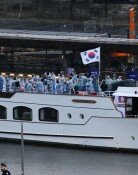Administrative City Gets Green Light
Administrative City Gets Green Light
Posted November. 25, 2005 08:29,
After the Constitutional Court ruled the special law on a new administrative city constitutional yesterday, the governments plan to build a new administrative city around Yeongi County and Gongju City in South Chungcheong Province is likely to gain momentum.
The construction of the new administrative city is scheduled to be completed stage by stage until 2030.
The full bench of the Constitutional Court dismissed a constitutional complaint against the special law for the new administrative city filed by 222 people, including members of the Seoul City Council by a judges vote of 7-2.
When judges turn down a complaint, it means that since lodging a complaint itself does not constitute the legal requirement, the complaint should not be filed.
The Constitutional Court, however, in effect ruled that the law is constitutional, citing, The special law on a new administrative city is not regarded as a division of the capital.
In response, the government announced that it will launch land compensation measures for the designated area of about 22.12 million pyeong for the new administrative city on December 15 and set up an Administrative City Construction Agency next January 1.
A total of 49 government agencies and 17 government-funded research institutions, including 12 ministries, four offices and two agencies, excluding Cheong Wa Dae, the Ministry of Unification, the Ministry of Foreign Affairs and Trade, the Ministry of Justice, the Ministry of National Defense, the Ministry of Government Administration and Home Affairs, and the Ministry of Gender Equality and Family, will be relocated to the new administrative city by 2030.
It its ruling statement, the Constitutional Court said, Since the special law is not against the consuetudinary law insisting Seoul is the capital of Korea, and since the law will not exert any influence on the presidential system in light of the Constitution, we cannot agree with the claimants claims in which they fear the possibility of an infringement of referendum and other basic rights.
One can file a constitutional complaint when ones basic rights were infringed upon or may be violated.
The Constitutional Court added, We judged that the new administrative city cannot be considered as a new capital under the special law, as well as that proceeding with the special law means neither relocating the current capital to the new administrative city nor dividing the capital into Seoul and the new administrative city.
But two judges, Kwon Seong and Kim Hyo-jong, found the special law unconstitutional, saying, Given that 73 percent of the administrative ministries will be relocated to the new administrative city, and 70 percent of the countrys administrative budget will be spent in the new administrative city, the special law can divide the capital into Seoul and the new administrative city.
The ruling by the Constitutional Court appears to have an influence on relocating a total of 175 public institutions in the metropolitan area to local provinces as well.
Some have pointed out that the government should not be in a hurry in relocating public institutions to local provinces, given that whether to push ahead with the special law is obscure, said an official with the Ministry of Construction and Transportation. We expect the construction of the new administrative city to gain momentum because fears were dispelled.
However, some pointed out that given that the construction of the new administrative city is a long-term national project, there is still the possibility of some details being changed in accordance with who will be sworn in as the next president.
Jae-Seong Hwang jsonhng@donga.com jin0619@donga.com







